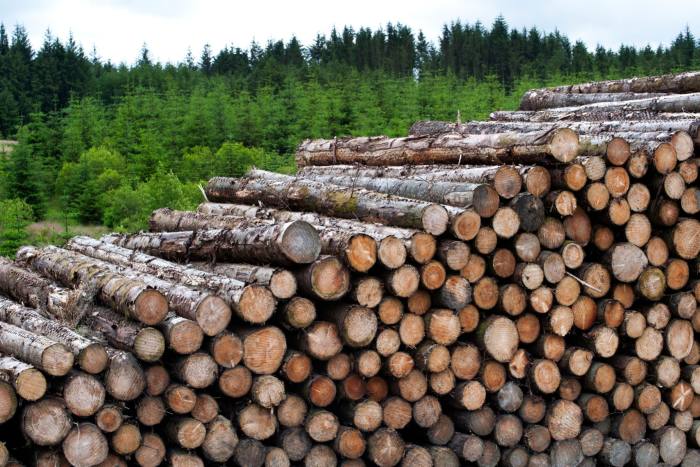Welsh village becomes battleground over ethics of afforestation
Dr John Llewellyn did not expect to be spending his retirement trying to block a tree-planting project close to his home in Cwrt-y-cadno, a sleepy village in the Welsh heartlands.
Yet, the retired GP has become one of the leaders of a campaign to halt a London-listed company that is seeking to develop land on Frongoch farm with financial backing from the Welsh government.
The clash speaks to a wider battle playing out in rural communities across the UK between new investors seeking to utilise state incentives for tree planting and residents, who fear such projects will harm local economies and ecology.
“I think it’s really upsetting to see companies coming from a distance, buying land in this area with the incentive to change the use of the land for short-term profit,” said Llewellyn, 64. “[They] are not taking into account the negative impacts that their policy and their plans have on the local environment.”
In 2021, the Welsh government formally adopted afforestation targets in an effort to reach its goal of net zero greenhouse gas emissions by 2050.
It aims to plant 43,000 hectares of mixed woodland in Wales by 2030 to remove CO₂ from the atmosphere — rising to 180,000 hectares by 2050.
The Welsh government has created a package of grants to encourage investment into tree planting, such as Glastir Woodland Creation, which has paid out more than £10mn so far. In September, it launched two further funding schemes for farmers and landowners worth £32mn.
In Cwrt-y-cadno village, Carmarthenshire, once an important interchange for local cattle drivers, Foresight Sustainable Forestry Company is one such company trying to seize the opportunity.

It has so far acquired about 50 land sites across the UK since its flotation on the London Stock Exchange last year, which raised £130mn.
In July 2021, Foresight initially applied for planning permission to plant on 60 hectares of land but has since scaled this back to 42.5 hectares, following a backlash from residents who argue that the introduction of a non-native species could damage local habitats, food production and their way of life.
The types of tree being planted has become a bone of contention. The company plans for almost three quarters of the trees to be conifers, which are an outside species. However, critics have said this threatens biodiversity and have demanded they plant solely native broadleaves.
Foresight’s proposed design is still under consideration by the Welsh government body Natural Resources Wales.
Opposition to the project has been supported by a coalition of organisations including the charities the Initiative for Nature Conservation Cymru, and Cambrian Mountains Society, the Countryside Alliance Wales, a political campaign group, and Farmers’ Union of Wales.
Rob Parry, chief executive of INCC, recognised that “tree planting is important” but added that many of the sites proposed “are incredibly important habitats themselves and we risk losing one habitat for another”.
Meanwhile, farmers are concerned that they could find themselves priced out of good quality land as they struggle to compete with wealthy companies, in a debate that has risen as high as parliament. In spring, the Welsh affairs committee published a report on the risks posed to family farms.
Llewellyn said: “Not only would Welsh language, culture, heritage and community disappear if this project was replicated elsewhere, but this poses an existential threat to upland sheep farming communities throughout Wales.”
However, Foresight said it had factored in local concerns and that an independent ecologist had assessed the plans and forecast an improvement in the biodiversity of the site over time using the Department for Environment, Food & Rural Affairs’ biodiversity metric, which calculates the net gain of such projects.
The Welsh government defended its efforts to tackle climate change: “We need to plant 86mn trees by the end of this decade if we are to meet our net zero target by 2050. Beyond addressing the climate and nature emergencies . . . tree planting offers a considerable opportunity to the rural economy.
“We will only fund woodland projects that are able to demonstrate they meet the high standards required by our schemes,” it added.

Many asset managers are jumping on a boom in the sale of units linked to the carbon stored in trees that are used to meet climate goals. Last year, Manulife, Gresham House and JPMorgan all launched or grew businesses around forestry offsets.
Carbon credits (or offsets) are each supposed to represent a tonne of carbon avoided or removed from the atmosphere, and are used by companies to compensate for their emissions.
The price per plantable hectare of land increased 48 per cent between 2020 and 2021, according to forestry management company Tilhill’s 2021 UK forest market report, which said that demand for suitable land from investors was “sky-high”.
But some green campaigners have criticised carbon credits for opening the door to “greenwashing”, as buyers can purchase them without addressing their own output.

In response, Richard Kelly, co-head of Foresight, denied the claims of greenwashing, saying the company would generate credits issued by the Woodland Carbon Code, a UK-government backed quality assurance standard for woodland creation projects that offers independent verification for carbon units.
He added that the company offered “many farmers an attractive exit” and paid a “premium above agricultural value” at a difficult time for the sector. The company has also launched a forestry skills training programme.
Rachel Evans, director for Wales at the Countryside Alliance, called for rural community impact assessments to be undertaken before permission is granted for such projects.
“We are not opposed to tree planting, absolutely not,” she said. “But it has to be the right tree in the right place, and it has to be for the right effect.”
For all the latest Business News Click Here
For the latest news and updates, follow us on Google News.

